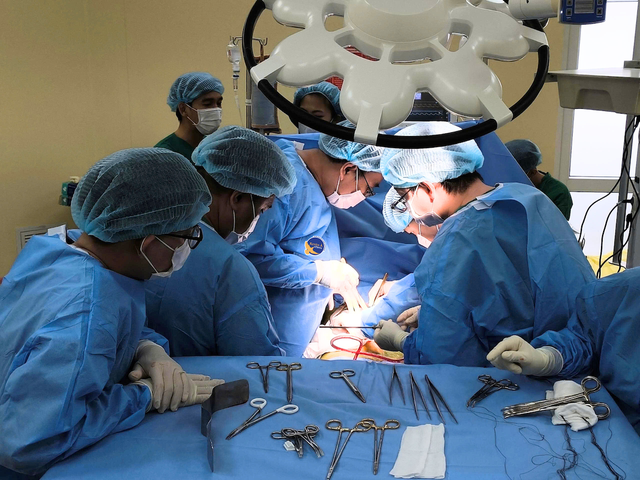Detect kidney failure, must have regular dialysis to maintain life
Ms. T. has had rheumatoid arthritis since she was 28 years old, and since then she has had to use painkillers, anti-inflammatory drugs, especially corticosteroids and non-steroidal anti-inflammatory drugs to control the pain. Since 2020, she has begun to experience unusual symptoms such as muscle atrophy, generalized edema, prolonged fatigue, and poor appetite. After examination, she was diagnosed with chronic kidney failure and had to undergo conservative treatment.
By 2023, her condition had worsened and she was forced to undergo regular dialysis to stay alive. During the first year of dialysis, she suffered from urinary tract obstruction, which further weakened her health and made daily activities difficult.
Miraculous revival after kidney transplant from daughter
In 2025, due to her increasingly critical health condition, Ms. T.'s family met to discuss a kidney transplant plan for her. After a health check, Ms. D. (32 years old, Ms. T.'s daughter) decided to donate a kidney to save her mother.

Doctors in kidney transplant
PHOTO: XA
At the end of June 2025, a kidney transplant surgery for Ms. T. with a kidney donated by her daughter took place at Xuyen A General Hospital, with the coordination of the hospital's Urology team and doctors from Cho Ray Hospital. After more than 5 hours, the donated kidney began to function in the mother's body, and the patient also had urine right on the operating table - a sign that the kidney transplant was successful. After 3 days, the patient's kidney function was stable. Up to now, the health of both mother and child has recovered well, the patient can walk, eat and live normally.
On July 22, specialist doctor Vu Le Anh - Head of the Department of Nephrology, Xuyen A General Hospital said that patient T. had many underlying diseases such as rheumatoid arthritis and drug-induced Cushing's disease, along with osteoporosis and obesity, so there was a high risk of many problems occurring after a kidney transplant such as susceptibility to infection and diabetes.
Furthermore, with rheumatoid arthritis, regular medication is also detrimental to surgery, so before surgery, the team studied and adjusted the dose of corticosteroids to the lowest possible level to control the patient's symptoms of pain in the joints of the limbs. After the transplant, the patient's intravenous fluids were also adjusted to an appropriate level to avoid increased blood sugar.
Warning of dangers from abusing arthritis drugs
Dr. Le Anh said that Ms. T’s case is a reminder of the serious side effects of arthritis medications if not closely monitored. Prolonged use of immunosuppressants or corticosteroids can cause damage to the liver, stomach, and especially the kidneys.
“Many arthritis patients abuse painkillers every day without regularly monitoring their liver and kidney function. The drugs can cause acute interstitial nephritis, renal vasculitis, and over time lead to chronic kidney failure,” Dr. Le Anh warned.
Source: https://thanhnien.vn/nguoi-phu-nu-suy-than-sau-hon-20-nam-uong-thuoc-viem-khop-185250722162018532.htm






































































































Comment (0)